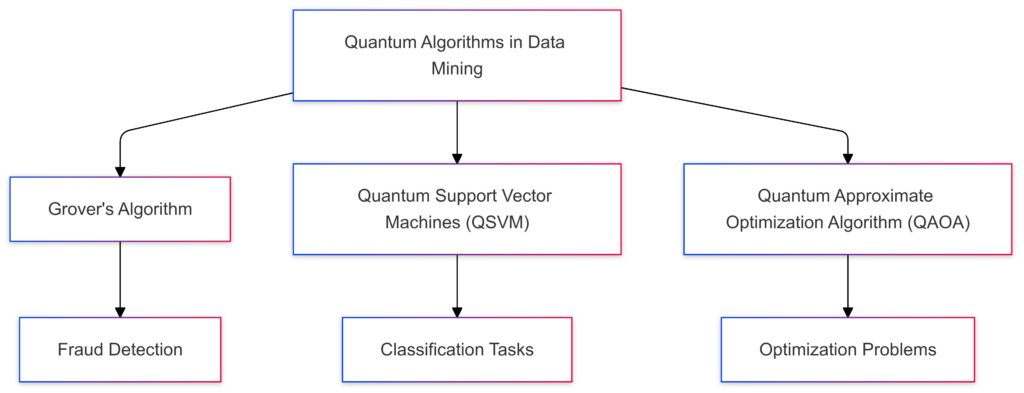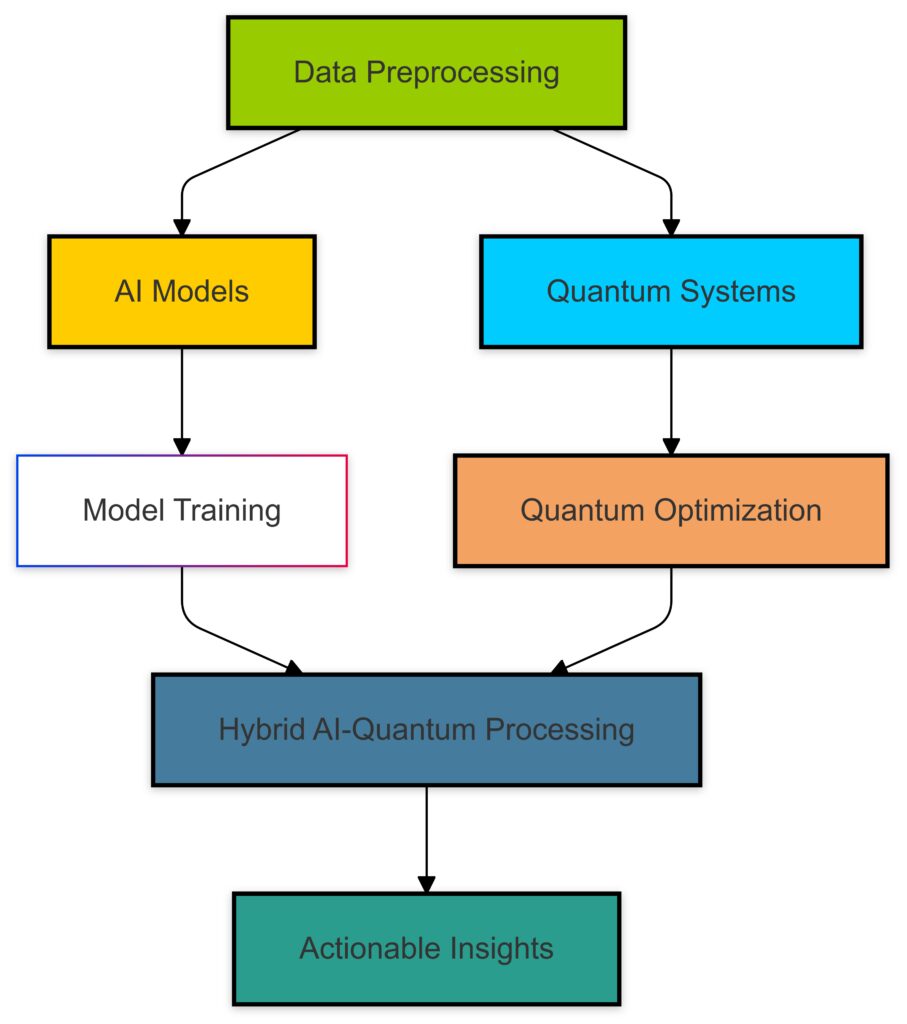
How Quantum Computing Transforms Data Mining
The Need for Quantum Speed in Data Mining
Traditional data mining algorithms, even the most advanced, face bottlenecks when processing massive datasets. Quantum computing offers a way to exponentially accelerate calculations by leveraging qubits, which process multiple states simultaneously.
This means:
- Complex pattern recognition that once took weeks can now be completed in hours.
- Insights from unstructured or real-time data streams become more feasible.
For example, Google’s quantum processor Sycamore recently demonstrated calculations that would take classical supercomputers 10,000 years—completed in just 200 seconds.
Quantum Algorithms for Data Mining
Quantum computing enhances traditional data mining with new algorithms designed to exploit its unique properties:
- Grover’s Algorithm: Speeds up database searches, reducing the time to find specific patterns in data.
- Use case: Searching for fraud in transaction datasets.
- Quantum Approximate Optimization Algorithm (QAOA): Solves optimization problems faster than classical algorithms.
- Use case: Optimizing supply chains by analyzing countless delivery route combinations.
- Quantum Support Vector Machines (QSVM): Supercharges classification tasks in machine learning.
- Use case: Identifying at-risk patients in healthcare datasets faster and with greater precision.
These algorithms open new frontiers in mining insights from both big data and dark data.

Grover’s Algorithm:
Application: Fraud Detection.
Enhances search speed within unsorted databases to quickly identify anomalies.
Quantum Support Vector Machines (QSVM):
Application: Classification Tasks.
Leverages quantum computing to improve the efficiency of traditional SVMs for classifying complex datasets.
Quantum Approximate Optimization Algorithm (QAOA):
Application: Optimization Problems.
Provides solutions for combinatorial optimization challenges like supply chain management or network optimization.
This visualization highlights how quantum computing revolutionizes data mining tasks, offering faster and more efficient solutions.
Scalability with Quantum Computing
As datasets grow, classical systems hit scalability barriers. Quantum computers thrive here because they process:
- Parallel computations: Unlike bits, qubits can represent multiple states simultaneously, slashing computation times.
- High-dimensional data: Quantum systems can handle more variables and relationships than classical ones, improving the analysis of complex networks like social graphs or genomic sequences.
For example, companies like D-Wave and IBM Quantum are already exploring applications in industries like finance, logistics, and pharmaceuticals.
AI’s Role in Next-Gen Data Mining

Why AI Is Indispensable
Artificial intelligence (AI) transforms data mining into a more autonomous, intelligent process. AI-powered algorithms don’t just process data—they learn from it, adapt, and optimize over time.
Key contributions of AI include:
- Automating Feature Selection: AI identifies relevant data features without manual intervention, improving efficiency.
- Real-Time Adaptation: Machine learning models can adjust to new data patterns instantly.
- Example: AI detecting fraud in financial transactions the moment it occurs.
- Enhanced Accuracy: Deep learning improves prediction quality, even in noisy or incomplete datasets.
AI enhances data mining by making it smarter, faster, and more adaptive to real-world challenges.
AI Meets Quantum: A Powerful Synergy
The combination of quantum computing and AI creates unparalleled possibilities for next-generation data mining.
- Training Speed: Quantum systems drastically reduce the time needed to train AI models.
- Example: Training a neural network on quantum computers can shrink from days to minutes.
- Complexity Handling: AI algorithms can leverage quantum systems for multi-variable problems, like simulating chemical reactions in drug discovery.
- Scalable Solutions: The synergy allows businesses to analyze global-scale data without compromising speed or accuracy.

Data Preprocessing:
Serves as the initial step, feeding both AI models and quantum systems with structured data.
AI Models:
Focuses on traditional model training pipelines, leveraging classical computational power.
Quantum Systems:
Supports tasks requiring enhanced optimization through quantum algorithms.
Quantum Optimization:
Handles complex calculations, such as combinatorial optimization or matrix inversions, augmenting AI efficiency.
Hybrid AI-Quantum Processing:
Merges insights from AI and quantum systems for advanced decision-making.
Actionable Insights:
The final outcome, providing meaningful results for use in industries like finance, healthcare, and logistics.
AI-Powered Algorithms Revolutionizing Data Mining
Several AI-driven algorithms are shaping the future of data mining:
- Deep Reinforcement Learning: Continuously optimizes decision-making processes, such as recommendation systems for e-commerce.
- Generative Adversarial Networks (GANs): Identify and reproduce hidden data patterns, useful for creating synthetic datasets or detecting anomalies.
- Natural Language Processing (NLP): Extracts insights from unstructured text data, like customer reviews or emails.
For example, Amazon uses NLP-enhanced algorithms to mine data from customer feedback and predict future shopping trends.
Industries Leading the Adoption of Quantum-AI Data Mining
Healthcare: Precision Medicine and Drug Discovery
Quantum computing helps process genetic data to design personalized treatments. Combined with AI, it accelerates drug discovery by analyzing molecule interactions and predicting drug efficacy.
- Example: Pfizer and IBM are collaborating on quantum-AI solutions to optimize chemical simulations for new medications.
Finance: Fraud Detection and Risk Assessment
Financial institutions leverage quantum-AI algorithms to detect fraud in real-time and assess portfolio risks.
- Example: JPMorgan Chase is experimenting with quantum optimization to model market behaviors and minimize trading risks.
Logistics: Route Optimization and Supply Chain Management
Quantum computing solves massive optimization challenges in logistics, such as reducing delivery times or minimizing fuel costs.
- Example: DHL uses quantum-inspired algorithms to optimize shipping routes, saving millions annually.
Advancements in Quantum-AI Data Mining Algorithms

Quantum Neural Networks (QNNs): The Next Frontier
Quantum Neural Networks (QNNs) blend the computational power of quantum systems with the flexibility of AI neural networks. QNNs excel at tackling large-scale problems like pattern recognition, classification, and optimization.
What makes QNNs unique?
- Exponential Speed: Quantum systems encode data in qubits, allowing them to process enormous datasets faster.
- Enhanced Learning: Quantum entanglement improves connections between neural layers, making learning faster and more accurate.
- Example: Classifying medical images for cancer detection at unprecedented speeds.
Researchers at Google AI Quantum are leading experiments to train QNNs for applications in healthcare and energy optimization.
Variational Quantum Algorithms (VQAs): Solving Complex Challenges
VQAs are specifically designed to operate within today’s noisy intermediate-scale quantum (NISQ) computers, balancing quantum speed with classical accuracy. These algorithms are particularly effective for optimization and data mining tasks.
- Hybrid Model: VQAs combine quantum and classical resources for flexible problem-solving.
- Example: Optimizing machine learning models for logistics by evaluating billions of potential delivery routes simultaneously.
Companies like Rigetti Computing and IonQ are spearheading VQA research for real-world applications, including supply chain management and climate modeling.
AI-Enhanced Data Encoding for Quantum Systems
Quantum computing relies on encoding classical data into quantum states. AI enhances this process by:
- Automating Feature Encoding: Ensuring only relevant data is encoded into quantum systems.
- Example: Preprocessing healthcare records to isolate key variables for treatment simulations.
- Optimizing State Mapping: AI identifies the most efficient qubit arrangements to minimize error rates.
This advancement reduces resource usage, making quantum-AI systems more accessible for businesses.
Quantum-AI Synergy: Real-World Case Studies

Energy Sector: Optimizing Renewable Energy Grids
Quantum-AI algorithms are transforming how energy grids handle dynamic inputs like weather, demand fluctuations, and power generation.
- Challenge: Balancing energy distribution across solar, wind, and traditional grids.
- Solution: Companies like Siemens use AI-trained quantum systems to model and optimize grid efficiency in real-time.
- Impact: Reduced energy waste and increased cost savings for utility providers.
Retail: Dynamic Pricing and Demand Prediction
Retailers rely on dynamic pricing to stay competitive, but accurately predicting demand across thousands of SKUs is challenging.
- Challenge: Extracting real-time insights from global market data.
- Solution: Alibaba combines AI’s predictive modeling with quantum’s ability to simulate customer behavior trends.
- Impact: Improved pricing strategies and better inventory management.
Climate Science: Modeling Global Weather Patterns
Traditional supercomputers struggle to simulate climate patterns due to the sheer complexity of variables involved. Quantum-AI systems provide a solution.
- Challenge: Simulating the impact of carbon emissions on global temperatures.
- Solution: IBM and the U.S. Department of Energy are developing quantum-AI models to process real-time climate data.
- Impact: More accurate predictions for climate policy development.
Pharmaceuticals: Accelerating Drug Discovery
The drug discovery process is notoriously slow, with trial-and-error testing often taking years. Quantum-AI systems accelerate this process.
- Challenge: Simulating molecular interactions for potential drug compounds.
- Solution: Pfizer uses quantum algorithms to model protein folding, while AI predicts drug efficacy.
- Impact: Faster identification of viable drug candidates, reducing development timelines.
Future Trends in Quantum-AI Data Mining

Hybrid Quantum-Classical Systems
While fully quantum systems are still developing, hybrid models that combine quantum processors with classical systems are becoming the norm. These systems allow businesses to:
- Gradually transition into quantum solutions.
- Leverage classical systems for data preprocessing while reserving quantum power for intensive computations.
Edge Quantum-AI for IoT Devices
Quantum-AI is moving toward edge computing, enabling real-time analysis on IoT devices:
- Example: Predictive maintenance in smart factories, where edge devices analyze sensor data in milliseconds.
Democratization of Quantum-AI Tools
Tech giants like IBM, Google, and Microsoft are building cloud-based quantum computing platforms, such as IBM Quantum Experience and Azure Quantum. These tools make quantum-AI capabilities accessible to smaller businesses, leveling the playing field.
FAQs
Are There Real-World Applications of Quantum-AI Synergy?
Yes, several industries are already exploring or adopting quantum-AI solutions:
- Healthcare: Predicting disease risks by analyzing genetic data with quantum-enhanced machine learning models.
- Finance: Detecting fraudulent transactions by analyzing millions of data points in real-time.
- Climate Science: Simulating complex climate models to predict long-term environmental impacts.
Example: Pfizer uses quantum algorithms to simulate molecular interactions during drug discovery, cutting years off development timelines.
What Are the Challenges of Implementing Quantum-AI Systems?
Adopting quantum-AI systems comes with hurdles, including:
- Hardware limitations: Current quantum computers are in their early stages (NISQ era).
- Data preprocessing: Classical systems must clean and structure data before feeding it to quantum systems.
- Cost: Developing or accessing quantum technology can be expensive for smaller organizations.
Example: A manufacturing company might struggle to analyze its sensor data with quantum systems due to noise and incomplete integration with its existing IT infrastructure.

Hardware Limitations:
Challenges: Limited availability of scalable quantum hardware and high error rates.
Mitigation:Quantum Error Correction.
Increased Funding for R&D.
Data Preprocessing Challenges:
Challenges: Handling quantum data formats and compatibility with classical systems.
Mitigation:Enhanced Preprocessing Tools.
Standardization of Quantum Data Formats.
Skill Gaps:
Challenges: Lack of expertise in quantum computing and AI integration.
Mitigation:Specialized Quantum-AI Training.
Industry-Academia Collaboration.
Ethical Concerns:
Challenges: Risks of misuse, lack of transparency, and fairness issues.
Mitigation:Ethical Guidelines and Regulations.
Improved Transparency in AI Models.
What Are Quantum Neural Networks (QNNs), and Why Are They Important?
Quantum Neural Networks (QNNs) merge quantum computing with AI’s neural networks. They process vast datasets at speeds unattainable by classical AI models.
Example: In image recognition, a QNN could classify medical scans for cancer detection faster than traditional deep learning models, providing life-saving results in less time.
Can Small Businesses Use Quantum-AI Technology?
Yes, thanks to cloud-based quantum platforms like IBM Quantum Experience and Microsoft Azure Quantum, small businesses can access quantum-AI tools without building their own infrastructure.
Example: A regional retailer could use cloud-based quantum-AI algorithms to analyze past sales trends and predict demand for seasonal products, optimizing inventory planning.
How Does Quantum Computing Help Solve Optimization Problems?
Quantum computing can evaluate multiple possibilities at once, making it ideal for optimization tasks like logistics, portfolio management, and scheduling.
Example: DHL uses quantum-inspired optimization algorithms to refine shipping routes, cutting delivery times and saving millions annually.
What Tools Are Available for Quantum-AI Data Mining?
Several tools and platforms are emerging to bridge quantum computing and AI:
- Qiskit (IBM): A Python-based framework for building quantum algorithms.
- TensorFlow Quantum (Google): Enables developers to create hybrid quantum-classical machine learning models.
- D-Wave Leap: A cloud service offering quantum-powered optimization tools.
Example: A financial analyst could use TensorFlow Quantum to train predictive models for stock market trends, leveraging both classical and quantum resources for faster insights.
How Do Quantum Computers Handle Big Data Better Than Classical Computers?
Quantum computers can process large-scale, high-dimensional datasets more efficiently by using qubits that operate in multiple states simultaneously. This capability allows for parallel computations that significantly reduce processing time.
Example: In social network analysis, quantum computers can quickly identify influential users by analyzing connections across millions of accounts, a task that would take classical systems much longer.
What Role Does AI Play in Optimizing Quantum Computing?
AI enhances the effectiveness of quantum systems by automating tasks like feature selection, error correction, and data encoding. This ensures quantum computers are fed clean, relevant data, maximizing their computational efficiency.
Example: In financial risk analysis, AI filters out noise and organizes historical market data, allowing quantum algorithms to predict future trends with greater precision.
How Does Quantum Computing Impact Machine Learning Models?
Quantum computing accelerates the training of machine learning models by optimizing complex computations. This is especially impactful for algorithms that involve vast feature spaces or require iterative training.
Example: Training a deep learning model for autonomous vehicles can take weeks on classical computers. Quantum systems reduce this timeline to days by parallelizing computations, such as feature extraction from sensor data.
Can Quantum-AI Systems Work with Unstructured Data?
Yes, AI-powered quantum systems excel at analyzing unstructured data like text, images, and videos. AI handles preprocessing tasks like natural language processing (NLP) or image recognition, while quantum algorithms identify hidden patterns or correlations.
Example: A news aggregator could analyze millions of unstructured articles using NLP to summarize trends, with quantum algorithms accelerating the process.
What Are the Ethical Considerations in Quantum-AI Data Mining?
Quantum-AI systems can amplify biases in data or raise concerns about privacy due to their power to process sensitive information at unprecedented speeds.
Key considerations:
- Ensuring datasets are unbiased and representative.
- Complying with data privacy regulations like GDPR or HIPAA.
- Monitoring algorithm outputs to prevent harmful decisions.
Example: An AI model trained to predict loan approvals could inherit bias from historical data, but quantum computing might amplify the scale of biased predictions if safeguards aren’t applied.
What Are Some Tools for Businesses to Explore Quantum-AI Applications?
Businesses can start leveraging quantum-AI capabilities with accessible platforms:
- IBM Quantum Experience: A cloud platform for experimenting with quantum algorithms.
- Microsoft Azure Quantum: Offers hybrid quantum-classical tools for industries like finance and logistics.
- TensorFlow Quantum: Integrates quantum computing into AI workflows for machine learning applications.
Example: A startup in drug development could use IBM Quantum Experience to simulate molecular interactions for potential treatments, saving costs on physical experiments.

Azure Quantum: High usability and strong adoption rate with moderate cost.
IBM Quantum: High usability and computational power with moderate cost.
TensorFlow Quantum: Cost-effective and moderately adopted, with average usability.
D-Wave Leap: Offers decent computational power but higher costs and lower usability.
Are Quantum Computers Reliable for Real-World Applications Today?
Current quantum computers are in the NISQ (Noisy Intermediate-Scale Quantum) era, meaning they’re not yet fully stable or scalable for every task. However, hybrid quantum-classical systems are already solving practical problems in optimization and machine learning.
Example: Volkswagen is using quantum-inspired computing to optimize traffic flow in cities like Lisbon, demonstrating the reliability of current quantum systems for specific applications.
What Industries Are Leading in Quantum-AI Adoption?
Several industries are embracing quantum-AI to solve complex problems:
- Pharmaceuticals: Accelerating drug discovery through molecular simulations.
- Finance: Enhancing fraud detection and portfolio optimization.
- Energy: Balancing renewable energy grids and optimizing resource allocation.
Example: BP is using quantum computing to simulate chemical processes, optimizing energy storage solutions for renewables like solar and wind.
How Does Quantum-AI Address Optimization Problems in Supply Chains?
Quantum-AI systems analyze massive datasets to uncover the most efficient solutions to logistics challenges, like route optimization or inventory management.
Example: UPS uses quantum-inspired algorithms to optimize delivery routes, reducing fuel consumption and delivery times, saving millions annually.
Resources
Quantum-AI Platforms and Tools
- IBM Quantum Experience
- A cloud-based quantum computing platform for experimenting with algorithms and AI integrations.
Learn more
- A cloud-based quantum computing platform for experimenting with algorithms and AI integrations.
- Microsoft Azure Quantum
- A platform offering quantum solutions for machine learning and optimization tasks.
Learn more
- A platform offering quantum solutions for machine learning and optimization tasks.
- TensorFlow Quantum
- Google’s framework for developing hybrid quantum-classical AI models.
Learn more
- Google’s framework for developing hybrid quantum-classical AI models.
- D-Wave Leap
- A platform providing quantum annealing tools specifically for solving optimization problems.
Learn more
- A platform providing quantum annealing tools specifically for solving optimization problems.
Research Papers and Reports
- Google AI Quantum Report (2019)
- Highlights the breakthrough of quantum supremacy with Google’s Sycamore processor.
Read the report
- Highlights the breakthrough of quantum supremacy with Google’s Sycamore processor.
- McKinsey: The Quantum Revolution in Business
- A detailed analysis of quantum computing’s impact across industries, with a focus on AI synergy.
Read here
- A detailed analysis of quantum computing’s impact across industries, with a focus on AI synergy.
- Gartner Report on Quantum Computing
- Insights on how businesses are leveraging quantum technologies in data mining and AI.
Read here
- Insights on how businesses are leveraging quantum technologies in data mining and AI.
Quantum Computing News and Blogs
- Quantum Daily
- Covers news, advancements, and case studies in quantum computing and AI.
Visit here
- Covers news, advancements, and case studies in quantum computing and AI.
- Towards Data Science on Medium
- Articles about applying AI and quantum computing to real-world problems.
Visit here
- Articles about applying AI and quantum computing to real-world problems.
- ZDNet Quantum Computing
- Features industry news and use cases for quantum systems in AI and beyond.
Visit here
- Features industry news and use cases for quantum systems in AI and beyond.
Professional Communities and Forums
- Stack Exchange: Quantum Computing
- A dedicated Q&A platform for quantum computing professionals and enthusiasts.
Visit here
- A dedicated Q&A platform for quantum computing professionals and enthusiasts.
- Quantum Open Source Foundation (QOSF)
- A community promoting the use of open-source tools in quantum computing and AI.
Visit here
- A community promoting the use of open-source tools in quantum computing and AI.
- Kaggle Competitions
- Challenges in machine learning and quantum computing for professionals and learners.
Visit here
- Challenges in machine learning and quantum computing for professionals and learners.